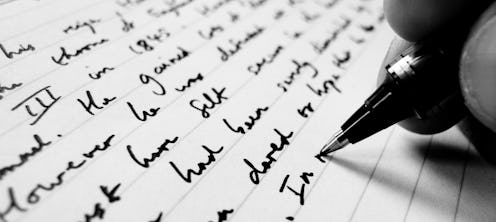
New Year’s resolutions are for optimists, which, as a writer, I certainly am not. But I do find it vaguely thrilling, and very frightening, to imagine all the as-yet-unarticulated words and sentences and stories that will (and they will, dammit!) come to fruition in 2015.
Thing is, as exciting as it is to imagine what You Circa 2015 are capable of creating, in order to create — whether it’s that collection of short stories you’ve been sitting on since high school, a dissertation with a rapidly looming deadline, or a mere conception of a story that just needs a life-giving spark — you need to sit down and do it.
I’ve rounded up a collection of tips from seasoned writers to help you with that sitting-down-and-doing-it-process. If you’re still in the inspiration-seeking stages, try heeding André Aciman’s counsel and start from the very beginning: find what makes you tick, what makes you you, and write from there. Or, if you’re stuck on a stubborn character, try out Charlie Jane Anders’ fail-safe exercise to breathe some rounded life into that flat dud.
These tips are valuable, but they’re also extremely doable: treat them as habits rather than ideals, and you’ll be well on your way to your most productive year yet. Write on, pessimists!
André Aciman on uncovering your nerve — and owning it:
"Don't all writers have a hidden nerve, call it a secret chamber, something irreducibly theirs, which stirs their prose and makes it tick and turn this way or that, and identifies them, like a signature, though it lurks far deeper than their style, or their voice or other telltale antics? A hidden nerve is what every writer is ultimately about."
Ben Dolnick on setting a "writing quota":
"Get a kitchen timer. Writers are ingenious at redefining what qualifies as doing work (‘If I just spend this morning cleaning my desk…’). A kitchen timer tolerates no such nonsense. Set yourself a daily writing quota (as little as a half hour is fine at first), set the clock and get to work."
—In TimeOut
Justine Larbalestier on borrowing material:
"If you have no particular story to tell, then borrow one from someone else. This has worked pretty well for Shakespeare and pretty much every other great writer. The bible is good for plots, as are myths, fairy tales, legends, ballads, pop songs, and crappy movies that didn’t quite work (rewrite them so they do)."
Hilary Mantel on going with the flow:
"If you have a good story idea, don't assume it must form a prose narrative. It may work better as a play, a screenplay or a poem. Be flexible."
—In The Guardian
Jack Kerouac on free writing, plus an affirmation:
"28. Composing wild, undisciplined, pure, coming in from under, crazier the better; 29. You're a Genius all the time"
—In “Belief and Technique for Modern Prose”
Margaret Atwood on getting it together, girl!:
"You most likely need a thesaurus, a rudimentary grammar book, and a grip on reality. This latter means: there's no free lunch. Writing is work. It's also gambling. You don't get a pension plan. Other people can help you a bit, but — essentially you're on your own. Nobody is making you do this: you chose it, so don't whine."
—In The Guardian
E.B. White on keeping it simple:
"Don't write about Man; write about a man."
Dorothea Brande on a method of self-discipline:
“If you find yourself dreaming…or biting your pencil end, get up and go to the farthest corner of the room. Stay there while you are getting up steam. When you have your first sentence ready, go back to your tools. If you steadily refuse to lose yourself in reverie at your worktable, you will be rewarded by finding that merely taking your seat there will be enough to make your writing flow.”
Colson Whitehead on writing what you know:
"Write what you know. Bellow once said, 'Fiction is the higher autobiography.' In other words, fiction is payback for those who have wronged you...How do you make that which is your everyday into the stuff of literature? Listen to your heart. Ask your heart, Is it true? And if it is, let it be."
Stephen King on the first paragraph:
"When I'm starting a book, I compose in bed before I go to sleep. I will lie there in the dark and think. I'll try to write a paragraph. An opening paragraph. And over a period of weeks and months and even years, I'll word and reword it until I'm happy with what I've got. If I can get that first paragraph right, I'll know I can do the book."
—In The Atlantic
Charlie Jane Anders on origin stories:
"Write the story of how your main character dropped out of high school, ten years before your story begins. Or the tale of how your protagonist first realized they were different. Sometimes writing a brief, snappy tale of how the character learned something or dealt with something, that turned them into the person they were at the start of your story, can give you a powerful little nugget to keep in your back pocket."
—In io9
Images: churl, Jonathan Kim, Lew (tomswift) Holzman, Paul Bence, matryosha, Sarah Reid, Dave King, Tony Delgrosso/Flickr; Giphy (4)